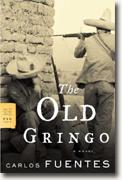The Old Gringo
Carlos Fuentes
book reviews:
· general fiction
· chick lit/romance
· sci-fi/fantasy
· graphic novels
· nonfiction
· audio books
· author interviews
· children's books @
curledupkids.com
· DVD reviews @
curledupdvd.com
newsletter
win books
buy online
links
home
for authors
& publishers
for reviewers

 |
The Old Gringo Carlos Fuentes, tr. Margaret Sayers Peden Farrar, Straus & Giroux Paperback 208 pages February 2007 |
|
The Old Gringo
“There’s one frontier we only dare to cross at night,” the old gringo said. “The frontier of our differences with others, of our battles with ourselves.”These are the words of General Arroyo, looking back on the old gringo’s (Ambrose Bierce’s) life in the book’s first chapter. This rather odd figure of a man, as he was first seen by Arroyo, Colonel Frutas Garcia, Inocencio Mansalvo, and a boy referred to as “young Pedro,” came riding across the border of Mexico at night on - of all things - a white horse, traveling lightly, with only a few sparse possessions in a suitcase. He figured it safer that way, and he wouldn’t need much since he intended to die in Mexico, anyway: If they opened his suitcase at customs, all they’d find would be a few ham sandwiches, a safety razor, a toothbrush, a couple of his own books, a copy of Don Quixote, a clean shirt, and a Colt .44 wrapped in his underclothes.Why the need for clean clothes, a razor, and a toothbrush, seeing as how he would be dead soon? “I intend to be a good-looking corpse,” he would tell any possibly inquisitive border guard. Why, then, the books? He’d explain, if asked, that he’d written two of them, one being the famous book of humorous but bitterly ironic definitions known as The Devil’s Dictionary, and that “All my life I’ve wanted to read the Quixote. I’d like to do it before I die. I’ve given up writing forever.” He ultimately does take up his pen again, briefly, though it’s never stated whether or not he gets through all of Quixote. He is, as portrayed by Fuentes, a very quixotic person himself. Ambrose Bierce: known as “Old Bitters” to many during his life because of his biting ironic wit, a man who served as a reporter on William Randolph Hearst’s newspaper, The San Francisco Chronicle until he got fed up with the hypocrisy of working for the same type of people his irony was meant to attack (though his readers always thought he must be referring to other people in his writing - it could never be us), a man who also fought in the Civil War against his own father, a man whose own children rejected him, possibly fearing that one day they would find themselves the subject of his sometimes cruel wit. Because of his service in the Civil War, General Arroyo called him the “Indiana General,” when not referring to him merely as “the old gringo.” Today, Bierce’s work is still widely read, his short story “An Occurrence At Owl Creek Bridge” often required reading in schools. He’s also the subject of a series of great books written by Oakley Hall, the latest being Ambrose Bierce and the Ace of Shoots, where he is depicted as still being on staff at Hearst’s paper and solving crimes in his spare time. If you are the type of person who loves being swept up in panoramic historical novels, if you are someone who dreams and cares about the significance that dreams have on our lives, or if you just enjoy reading damn fine excellent pieces of writing, you’ll want to add The Old Gringo Originally published on Curled Up With A Good Book at www.curledup.com. © Douglas R. Cobb, 2007 |
| Also by Carlos Fuentes: |
|
|
|
 Click here to learn more about this month's sponsor! |
|
| fiction · sf/f · comic books · nonfiction · audio newsletter · free book contest · buy books online review index · links · · authors & publishers reviewers |
|
| site by ELBO Computing Resources, Inc. | |
 Perhaps the greatest irony of all in
Perhaps the greatest irony of all in